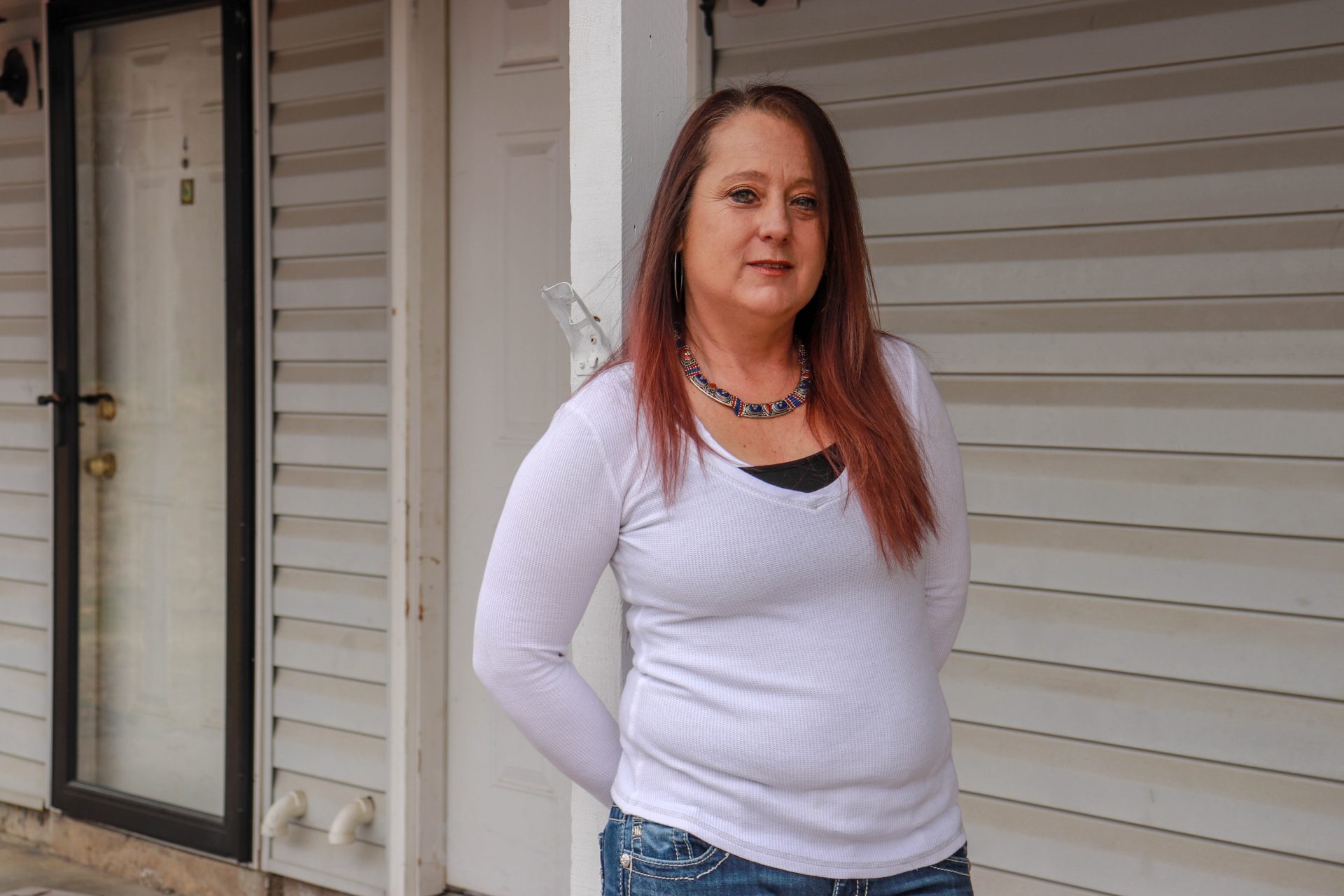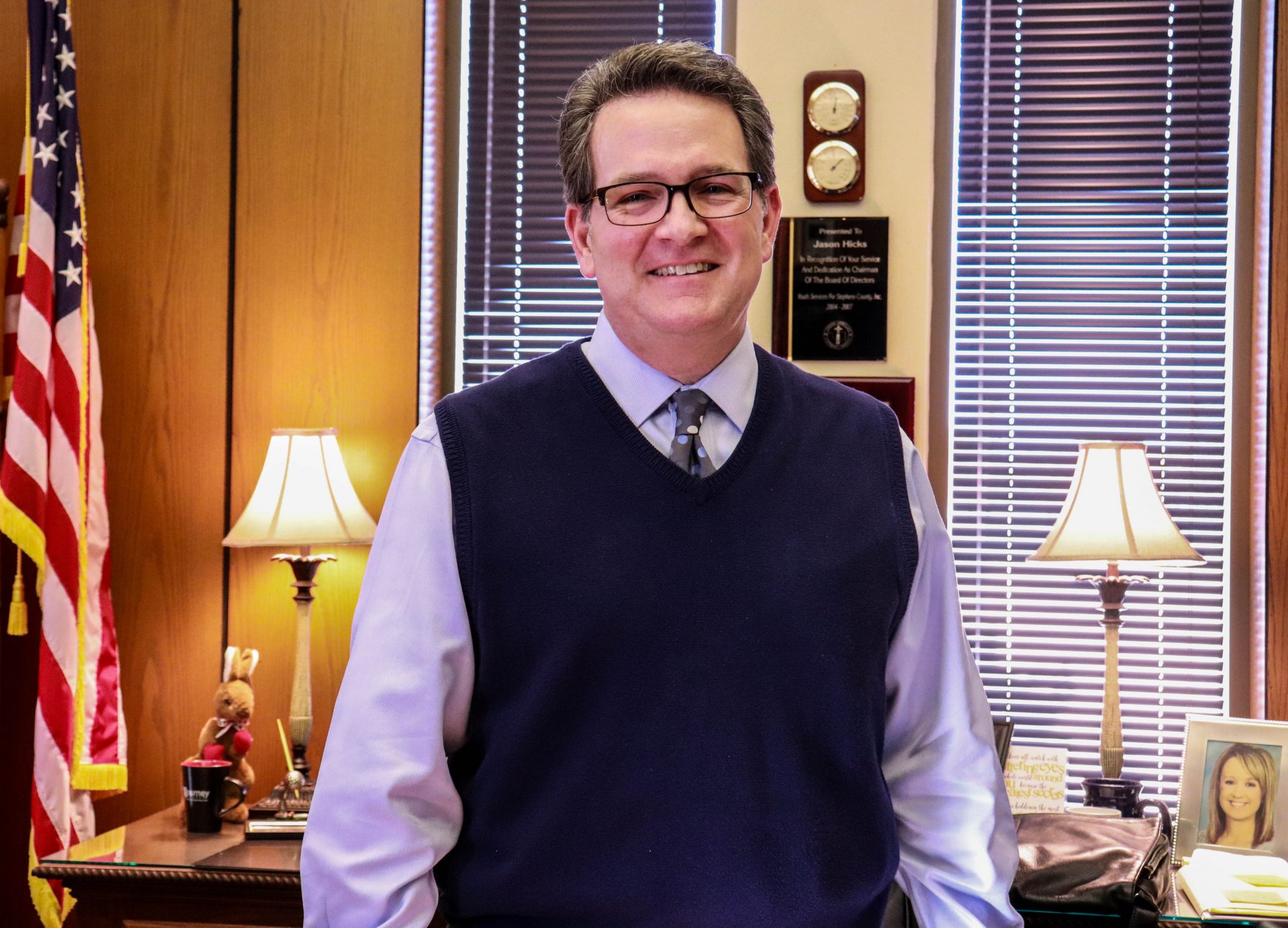
Tracy Smallwood is grateful for the life she's worked to build after leaving prison.
Quinton Chandler / StateImpact Oklahoma


Tracy Smallwood is grateful for the life she's worked to build after leaving prison.
Quinton Chandler / StateImpact Oklahoma

Quinton Chandler / StateImpact Oklahoma
Tracy Smallwood is grateful for the life she’s worked to build after leaving prison.
Tracy Smallwood says her life before she went to prison was just “dead time.”
“I was always in a room just getting high,” Smallwood explained. “But there’s so much more. So much more out there.
Smallwood tries to hold back tears in her two-bedroom apartment north of downtown Tulsa. Today, she’s an active church member, she’s in a 12-step recovery program and she works as a forklift operator. However, a few months ago, she was in prison for multiple drug-related convictions.
That was before nonprofit, Oklahomans for Criminal Justice Reform helped her and 20 other people build successful arguments for shorter prison sentences.
“They just gave me a step up and I was totally blessed,” Smallwood said. “(I’ve) been blessed ever since I’ve been out.”
Central to the argument for Smallwood’s release was State Question 780 — the overwhelmingly successful 2016 voter initiative that reduced felony punishments for drug possession and property crimes under a thousand dollars to misdemeanors. The worst punishment for those crimes now is a year in county jail — no prison time.
With help from Oklahomans for Criminal Justice Reform, Smallwood received a commutation and was released from prison.
State Question 780 didn’t apply to her or other people who were were convicted before it became law. Many of those people are still in prison for crimes that are now misdemeanors.
Some state legislators want to change that and make the sentences more equitable. Lawmakers are considering House Bill 1269, which would make State Question 780 retroactive and extend its provisions to people convicted before it took effect.
At least 2,000 people or a little more than seven percent of the state’s prison population could be affected.

Quinton Chandler / StateImpact Oklahoma
Bob Ravitz is the head public defender in Oklahoma County.
Bob Ravitz, the chief public defender in Oklahoma County supports House Bill 1269. Ravitz said voters chose not to prosecute the crimes outlined in the state question as felonies.
He and the measure’s other supporters say it will be a powerful step toward Oklahoma’s goal to shed its number one ranking in U.S. incarceration rates.
It’ll cut down on our prison population,” Ravitz said. “It’ll free up individuals who have minor felony convictions and allow them to become productive members of the workforce again.
Oklahomans for Criminal Justice Reform estimates about 65,000 people no longer in prison could have old felonies reclassified as misdemeanors, which could help when they apply for jobs, loans or rental contracts.
However, it’s unclear how many people currently in prison would be affected. Oklahoma Department of Corrections data from late January suggested at least 2,007 people would qualify for shorter sentences. Of that total, 992 people serving prison sentences for drug possession would be eligible for release without a court hearing. Some of these people could finish their sentences and be released before the bill has a chance to pass through the Legislature and get signed into law.
People convicted of stealing property valued under $1000 would have to petition the court to have their sentences changed. That’s where the issue becomes difficult. Prison officials don’t know how many people serving time for property crimes would be affected because Department of Corrections doesn’t have records showing the details of each case.

Quinton Chandler / StateImpact Oklahoma
District Attorney Jason Hicks keeps mementos from past cases on a dresser in his office.
Jason Hicks, the head prosecutor of Caddo, Grady, Jefferson and Stephens Counties, said figuring out who stole more than $1,000 would fall on the state’s district attorneys.
“We’re going to have to go back and pull our case files and figure out who had a piece of property in between that $500-$1000 mark,” Hicks said.
Hicks said hunting for those dollar amounts will take time and resources his office doesn’t have.
He and many other district attorneys did not support State Question 780 two years ago and they’re worried the retroactivity bill could have unintended consequences.
“That’s going to allow those people who are in drug court on those simple possession cases to walk away,” Hicks said.
He said the same thing could happen with people on probation who are being supervised to make sure they aren’t using drugs, drinking or falling back into criminal behavior.
Oklahoma County Public Defender Bob Ravitz acknowledged Hicks’ point, but he said there’s an easy fix.
Ravitz said the bill could be changed to say “‘if you’re currently in a drug court program, that the sentence will be a misdemeanor and you authorize a misdemeanor drug court”.
Ravitz suggested a similar change for people on probation.
District Attorney Hicks said changing felony sentences to misdemeanors will mean people who have committed more serious crimes may also qualify for reduced sentences.
For example, Hicks said repeat offenders charged with something such as rape often get longer sentences because of their past criminal history.
He wonders what would happen if, “in that history it’s one of those (State Question) 780 crimes?”.
State law does say someone with prior felony convictions can be sentenced more harshly than someone who’s never been in trouble. Hicks worries if House Bill 1269 passes in its current form, courts may have to reconsider sentences for repeat offenders who happen to have a prior conviction for one of the now reduced crimes such as drug possession.
Bob Ravitz agreed and said, “You can’t go back into all those convictions.” He said changing those sentences would put too much strain on prosecutors.
He also acknowledged the district attorney’s concern that people arrested for more serious crimes but who pleaded guilty to an offense listed in State Question 780 shouldn’t benefit from the retroactivity bill.
Representative Jon Echols, one of House Bill 1269’s authors said the bill is a work in progress, and he’s open to suggestions.
While standing inside her home in Tulsa, Tracy Smallwood looked around and listed all the ways her life has changed for the better. She supports the retroactivity bill because she wants other people to have the same opportunity she’s been given.
She said they can have a better life too if they can leave prison and are willing to work for a change.
“Whatever it takes to get some of these women out of prison, I’m so for it,” Smallwood said.